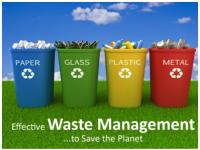 Why Waste Management Matters (and What We Can Do About It)
Why Waste Management Matters (and What We Can Do About It)
Let’s face it: every time we throw something in the trash, we rarely stop to think about where it goes. But that garbage doesn’t just disappear—it ends up in landfills, in oceans, or even in the air we breathe. And as the world produces more and more waste every day, the problem is only getting worse.
That’s why waste management matters more than ever. It's not just about getting rid of garbage. It's about how we, as a society, deal with the leftovers of our daily lives—responsibly, sustainably, and smartly.
 So, What Exactly Is Waste Management?
So, What Exactly Is Waste Management?
In simple terms, waste management is everything we do to handle the stuff we no longer need—collecting it, sorting it, treating it, recycling it, and (when there's no other option) safely disposing of it.
But it’s more than a system—it’s a mindset. It’s about seeing waste not just as trash, but as a resource that, if managed well, can actually do good.
 From Leftovers to Landfills: Types of Waste We Deal With
From Leftovers to Landfills: Types of Waste We Deal With
Not all waste is created equal. Different kinds of waste need different solutions:
- Household waste (like food scraps, plastic, and packaging)
- Industrial waste (chemicals, metal scraps, and factory by-products)
- E-waste (old phones, laptops, and gadgets)
- Biomedical waste (from hospitals and clinics)
- Agricultural waste (crop residues, manure, and spoiled food)
When these are all mixed together and dumped without proper treatment, it becomes a disaster for the environment and public health.
 The Big Problem with Waste Today
The Big Problem with Waste Today
Here’s the truth: we’re generating more waste than our systems can handle. And the results are all around us—overflowing bins, burning garbage, polluted water, and even wildlife eating plastic.So what’s going wrong?
- We don’t segregate waste properly at home.
- Many cities lack proper infrastructure to collect and treat waste.
- Awareness is low, and people often don’t know the right way to dispose of things.
- Policies exist, but enforcement is weak.
- And let’s be honest—most of us don’t really think about our trash once it’s gone.
 Smarter Ways to Handle Waste
Smarter Ways to Handle Waste
The good news? There are plenty of solutions—and they start with us. Here's how we can all play a role:
 1. Reduce, Reuse, Recycle
1. Reduce, Reuse, Recycle
Start by cutting down on what you throw away. Buy only what you need. Reuse bags, bottles, and containers. And always recycle when you can. It’s the classic 3R formula—and it still works.
 2. Compost Organic Waste
2. Compost Organic Waste
Instead of dumping food scraps and garden waste, turn it into compost. It’s easy to do at home and great for the soil. 3. Turn Waste into Energy
3. Turn Waste into Energy
Some waste that can’t be recycled can be burned in a safe, controlled way to generate electricity. It’s called waste-to-energy, and it’s being used in many cities around the world. 4. Make Producers Responsible
4. Make Producers Responsible
Companies should take responsibility for the waste their products create—especially electronics and plastic packaging. This is called Extended Producer Responsibility (EPR). 5. Spread Awareness
5. Spread Awareness
Change starts with awareness. Schools, colleges, and communities need to talk more about waste and how to manage it better.A Quick Look at India’s Waste Story
India produces over 160,000 tonnes of waste every single day. That’s like filling up over 40,000 trucks with garbage daily! Some cities, like Indore and Mysuru, have taken the lead by implementing smart waste practices like door-to-door collection, source segregation, and composting plants.
But there’s still a long way to go. Many smaller towns and rural areas lack proper systems, and informal waste pickers—who do a huge amount of recycling—don’t get enough support.
 Wrapping Up: It Starts With Us
Wrapping Up: It Starts With Us
Here’s the deal: waste isn’t just the government’s problem. It’s not just about big corporations or fancy technologies. It’s about you and me.
Every plastic bag we avoid, every item we recycle, every time we compost—it adds up. Small actions lead to big changes.
So next time you’re about to throw something away, ask yourself: Is this really waste? Or can it be part of a smarter solution?
Because in the end, waste is just a resource in the wrong place. Let’s all do our part to put it in the right one.


